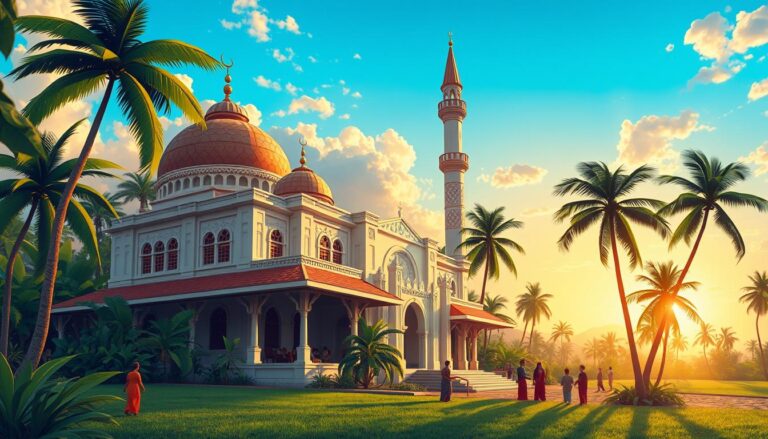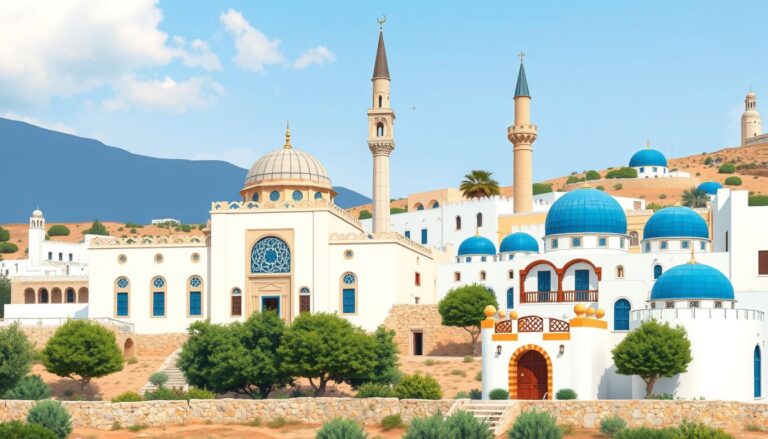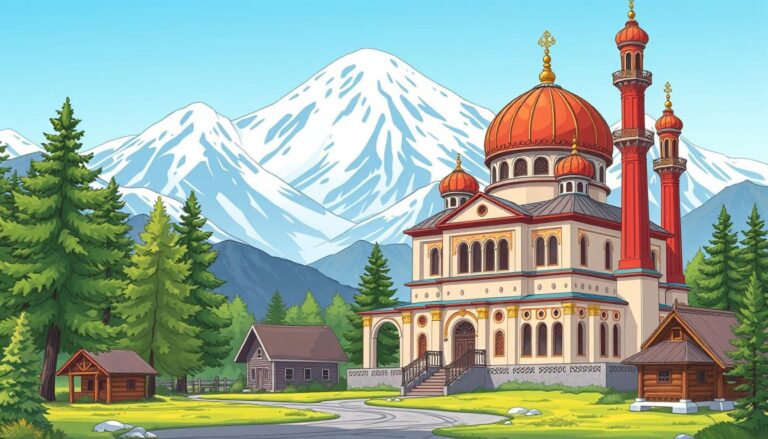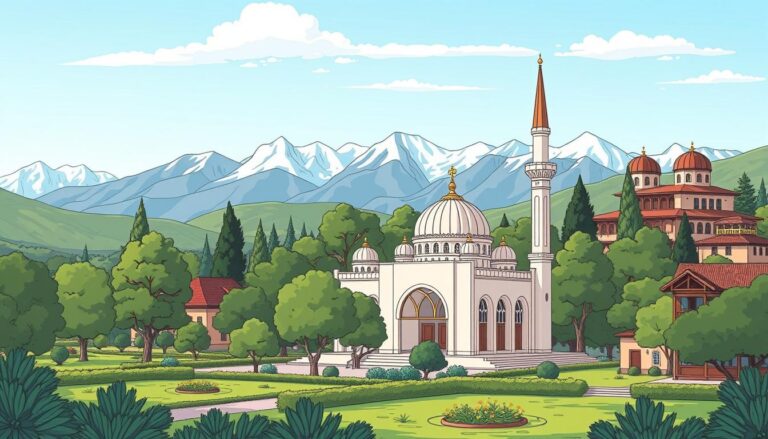Islam in the Netherlands
Islam is the second-largest religion in the Netherlands, with nearly one million adherents representing 5.8% of the country’s population. This significant Muslim presence has shaped the cultural fabric of Dutch society, leading to both opportunities and challenges as the nation grapples with the realities of a diverse, multi-faith landscape.
The Netherlands’ Muslim community is diverse, with the majority tracing their roots to Turkey and Morocco. Their journey in the country has been marked by both successes and setbacks, as they strive to maintain their cultural identity while seamlessly integrating into Dutch society.
Key Takeaways
- Islam is the second-largest religion in the Netherlands, with nearly one million adherents representing 5.8% of the country’s population.
- The Muslim community in the Netherlands is diverse, with the majority tracing their roots to Turkey and Morocco.
- The integration of Muslims into Dutch society has faced both challenges and successes, as they balance their cultural identity with the values of their adopted homeland.
- Prominent Muslim communities, such as the Turkish and Moroccan Muslims, have established a significant presence in the country’s major cities.
- Islamic practices and institutions, including mosques and Islamic schools, have become an integral part of the Netherlands’ diverse religious landscape.
Introduction to Islam in the Netherlands
The historical overview of Islam in the Netherlands reveals a gradual yet significant presence of the Muslim community in the country. From the 16th century, when a small number of Ottoman merchants settled in Dutch port cities, to the present day, the demographics of the Muslim population in the Netherlands have undergone remarkable transformations.
Historical Overview
The early roots of Islam in the Netherlands can be traced back to the 17th century, when the first improvised mosques were built in Amsterdam. In the following centuries, the country experienced sporadic Muslim immigration from the Dutch East Indies, which was part of the Dutch overseas possessions for an extended period. During this time, the Dutch East Indies contained the world’s second-largest Muslim population, after British India.
However, the number of Muslims in the European territory of the Kingdom of the Netherlands remained relatively low, accounting for less than 0.1% of the population until the mid-20th century.
Demographics
The demographics of the Muslim population in the Netherlands have undergone significant changes over the years. In the 1970s, the estimated number of Muslims in the country was around 50,000, growing to about 100,000 by 1975. By 1994, the Muslim population had increased to almost 628,000, accounting for less than four percent of the total Dutch population.
The establishment of the first formal Islamic organization in the Netherlands dates back to 1932, and until the beginning of the 1980s, Islam led a relatively “hidden existence” in the country. However, changes in statutory regulations for Muslims in the Netherlands were heralded around 1980, and the public’s attention towards Islam increased, partly due to international incidents like the upheavals in Iran.
“The Netherlands as a postcolonial society with a significant number of Muslim immigrants, and the historical presence of Muslim subjects in the Dutch state due to overseas colonies like Indonesia and Suriname, have played a crucial role in shaping the demographics and integration of Islam in the country.”
Prominent Muslim Communities
The Netherlands has seen a significant presence of Muslim communities, primarily composed of individuals with Turkish and Moroccan backgrounds. These communities have played a vital role in shaping the cultural landscape of the country.
Turkish Muslims
The Turkish Muslim community in the Netherlands is one of the largest and most well-established. Many of these individuals or their ancestors came to the country as guest workers during the economic boom of the 1960s and 1970s. Over time, the community has grown through family reunification and continued immigration. Today, the Turkish Muslim community is estimated to constitute around 2.5% of the Netherlands’ total population.
Moroccan Muslims
The Moroccan Muslim community in the Netherlands is another prominent group, with roots tracing back to the same period of guest worker recruitment. Like the Turkish community, the Moroccan Muslim population has expanded through family reunification and ongoing immigration. This community is estimated to make up approximately 2% of the Netherlands’ total population.
Both the Turkish and Moroccan Muslim communities have maintained strong cultural ties to their ancestral homelands, while also adapting to life in the Netherlands. They have contributed to the diversity and richness of the country’s social fabric, often playing a vital role in various sectors, including business, education, and the arts.
“The presence of these prominent Muslim communities in the Netherlands has not only enriched the country’s cultural landscape but also highlighted the importance of embracing diversity and promoting mutual understanding.”
Islamic Practices in Dutch Society
Islam has a significant presence in the Netherlands, with Muslims comprising around 5% of the total population. The majority of Dutch Muslims belong to the Sunni denomination and reside in the country’s major cities, including Amsterdam, Rotterdam, The Hague, and Utrecht.
The integration of Islamic practices into Dutch society has been a topic of discussion and adaptation. Adjustments have been made to accommodate religious minorities, such as allowing the ritual slaughter of animals. Sufi orders have also played a crucial role in the institutionalization of Islam in the Netherlands.
Interestingly, the integration of Islamic practices in Dutch society has resulted in diverse religious beliefs and practices among second-generation Turkish migrants. Researchers have focused on the integration of Islamic practices in the Netherlands and the subjective well-being of young Turkish Muslims.
Islamic primary schools have also been a subject of discussion within the context of Muslim organizations in the Netherlands. The history of Muslim umbrella organizations in the country has been analyzed, highlighting the changing role of Islam and Muslim organizations among Turks and Moroccans.
The integration of Islamic practices in the Netherlands has been a complex and multifaceted process, involving legal adjustments, religious institutionalization, and the evolution of religious beliefs and practices among different Muslim communities.
Islam in the Netherlands
The Rise of Muslim Population
The Netherlands has witnessed a steady rise in its Muslim population over the past few decades. This demographic shift can be attributed to several factors, including economic opportunities and family reunification efforts. Between 1960 and 1973, the Dutch government actively recruited foreign skilled laborers, primarily from Morocco and Turkey, both of which are majority-Muslim countries. Later, waves of Muslim immigrants arrived through family reunification and asylum seeking, further contributing to the growing Muslim community in the Netherlands.
According to recent data, approximately 825,000 Muslims reside in the Netherlands, making up around 6% of the total population. The concentration of Muslim communities is particularly prominent in poorer neighborhoods of major cities like Amsterdam, Rotterdam, Utrecht, and The Hague.
Challenges of Integration
The influx of Muslim immigrants has presented both opportunities and challenges for integration into Dutch society. While the Netherlands is known for its progressive values, such as freedom of religion and gender equality, some Muslim communities have faced difficulties in adapting to the local cultural norms and practices.
Studies have shown that Muslims from North African origin, particularly those of Moroccan descent, have reported higher rates of discrimination in the Netherlands, with 65% experiencing it over the past five years and 49% in the last 12 months. In comparison, Muslims of Turkish origin reported slightly lower rates of discrimination, at 59% over five years and 39% in the last year.
Despite these challenges, the majority of Muslims in the Netherlands are aware of anti-discrimination legislation, with 78% of North African Muslims and 70% of Turkish Muslims reporting knowledge of such laws.
The integration of Muslims into Dutch society remains an ongoing process, with both the government and the Muslim community working to address issues of discrimination and promote mutual understanding.
Islamic Education and Institutions
The Netherlands has a robust network of Islamic schools and religious centers that play a crucial role in serving the growing Muslim population. These institutions provide religious education, community services, and help preserve Islamic traditions within the Dutch context. While the government has policies to regulate and support these establishments, there are ongoing discussions about their role in promoting integration and addressing potential segregation.
Islamic Schools
In 2018, the Netherlands had 52 primary Islamic schools catering to around 12,500 pupils, primarily of Turkish and Moroccan descent. These schools cater mostly to pupils from socioeconomically disadvantaged backgrounds and receive nearly double the budget compared to schools with a predominantly non-disadvantaged population. Islamic schools in the Netherlands were initially established to address dissatisfaction with existing schools due to the absence of Islamic instruction and cultural practices, resulting in a focus on strengthening cultural and religious identity and improving academic achievement.
Despite being controversial, Islamic schools in the Netherlands have shown relatively high academic achievement compared to schools with similar disadvantaged pupil populations, performing better on most indicators. However, recent problems with Islamic secondary schools, including exam theft and ties to extremist organizations, have led some politicians to propose abolishing the Freedom of education act, which could impact the establishment of new Islamic schools in the future.
Mosques and Religious Centers
- The Netherlands is home to a growing number of mosques and religious centers that serve the Muslim community.
- These institutions provide a space for worship, community gatherings, and the preservation of Islamic traditions.
- Mosques in the Netherlands have faced increased scrutiny in recent years, particularly in the wake of security concerns and the threat of radicalization.
- The interpretation of Islamic principles within the Dutch context is seen as a crucial opportunity to educate and empower Muslim youth against radical ideologies.
Overall, Islamic education and institutions in the Netherlands play a significant role in the lives of the country’s Muslim population, contributing to religious and cultural identity, community cohesion, and academic achievement. However, these institutions also face ongoing debates and challenges related to integration, segregation, and security concerns.
Islam and Dutch Values
The Netherlands is renowned for its progressive values, including a strong emphasis on freedom of religion and gender equality. These principles have significantly shaped the integration of Islam into Dutch society, leading to both areas of harmony and potential tension.
Freedom of Religion
The Dutch constitution guarantees the right to freely practice one’s religion. However, there have been ongoing debates about the extent to which certain Islamic practices align with the country’s progressive norms, particularly regarding the separation of church and state.
Gender Equality
Gender equality is a cornerstone of Dutch society, but there have been discussions about the compatibility of some Islamic traditions with this principle. The integration of Muslim women into the workforce and their participation in public life have been topics of interest and, at times, controversy.
Despite these challenges, the Netherlands has maintained a commitment to accommodating religious diversity while upholding its core values. The country’s proportional representation system in politics has allowed for a diverse range of parties and opinions, leading to coalition governments that navigate the complexities of balancing individual rights and social cohesion.
“The Dutch Constitution explicitly guarantees freedom of religion and belief in Article 6, while Article 1 ensures equal treatment based on religion and belief.”
However, the political landscape has also seen the rise of anti-Islam sentiment, with parties like the Party for Freedom (PVV) gaining significant support. This highlights the ongoing tensions between the Netherlands’ progressive values and the integration of Muslim communities.
Ultimately, the intersection of Islam and Dutch values is a nuanced and evolving topic, requiring continuous dialogue, mutual understanding, and a commitment to upholding the country’s core principles of freedom and equality.
Political Representation of Muslims
The political representation of Muslims in the Netherlands has been a topic of ongoing discussion and debate. While Muslims have been actively involved in the country’s political landscape, serving in various government and leadership roles, the extent of their representation has been a subject of scrutiny.
According to recent studies, around 6 percent of the adult population in the Netherlands are Muslims, totaling around one million people. The majority of this Muslim population is of Turkish or Moroccan origin, with 86 percent and 94 percent, respectively, identifying as Muslim.
Despite their significant presence, the political representation of Muslims in the Netherlands has faced challenges. Incidents like the controversial statements made by politicians such as Hans Janmaat and Geert Wilders have highlighted the tensions surrounding the integration of Muslim communities and their political influence. Wilders, the leader of the PVV party, has received criticism and legal actions for his remarks, which have ranged from proposing to ban the Quran to revoking the passports of Muslims born in the Netherlands.
However, the situation has evolved over time, with a shift in societal attitudes. While Wilders was initially acquitted for his remarks in 2004, he was later convicted for statements made in 2016, indicating a progression in the way such comments are perceived and addressed.
Nonetheless, the political representation of Muslims in the Netherlands remains a complex and often contentious issue, with ongoing discussions about balancing the principles of democracy, religious freedom, and cultural integration.
“The political representation of Muslims in the Netherlands is a delicate and nuanced issue, requiring a careful balance between respecting democratic values and addressing the concerns of diverse communities.”
Islamophobia and Discrimination
The Netherlands, like many European countries, has faced a rise in Islamophobia and incidents of discrimination against its Muslim population. The murder of filmmaker Theo van Gogh in 2004 was a pivotal moment that heightened tensions and fueled anti-Islamic sentiments in some segments of Dutch society.
Incidents and Hate Crimes
According to reports, the number of discrimination incidents against Muslims recorded by the Dutch police increased from 150 in 2013 to 230 in 2014. Civil society organizations and anti-discrimination bureaus have also noted an escalation in attacks, particularly targeting Muslim women who wear headscarves or face-veils. In fact, 73% of Afghani-Dutch Muslim women wearing a headscarf reported experiencing discrimination based on their religion.
Furthermore, the majority of perpetrators of these discrimination incidents, as recorded by Meld Islamofobie, were men, with 90% of the victims being Muslim women. This highlights the disproportionate impact of Islamophobia on Muslim women in the Netherlands.
Government Initiatives
The Dutch government has responded to the rise of Islamophobia with various initiatives to promote interfaith dialogue, address hate crimes, and foster greater social cohesion. However, challenges remain in tackling the complex issue of discrimination against Muslims.
One promising development is the increase in the number of opinions issued by the Equal Treatment Commission on cases related to discrimination on the basis of religion, with 53% of these cases concerning Islam between 2010-2014. This suggests a growing awareness and commitment to addressing Islamophobia in the Netherlands.
“Approximately 100,000 undocumented individuals live in the Netherlands due to national immigration and refugee regulations, potentially exposing them to risks of racism, violence, and labor exploitation in the informal job market.”
Despite these efforts, the Netherlands continues to grapple with the complex challenges of Islamophobia and discrimination against its Muslim citizens. Addressing these issues will require a comprehensive, multi-faceted approach involving all sectors of society.
Cultural Contributions of Dutch Muslims
The Dutch Muslim community has left an indelible mark on the country’s vibrant cultural landscape. From the realms of arts and literature to the realms of cuisine and fashion, Muslim influence has enriched the Netherlands’ cultural tapestry, showcasing the diverse and dynamic nature of its Islamic heritage.
Arts and Literature
Dutch Muslims have made significant contributions to the country’s arts and literature. Writers like Abdelkader Benali and Naema Tahir have crafted acclaimed works that explore the nuances of identity, integration, and the Muslim experience in the Netherlands. Visual artists, such as Yasmin Kessler and Younes Bouadi, have garnered recognition for their thought-provoking paintings and installations that shed light on cultural intersections.
Cuisine and Fashion
The culinary landscape of the Netherlands has been profoundly shaped by the influence of Dutch Muslims. From the aromatic spices and flavorful dishes of Moroccan and Turkish cuisine to the innovative fusion creations that blend Dutch and Middle Eastern flavors, Muslim-owned restaurants and food trucks have become beloved destinations for food enthusiasts. Similarly, the fashion industry has seen the rise of Dutch Muslim designers who have infused their collections with elements of traditional Islamic aesthetics, creating a unique and vibrant sartorial expression.
The cultural contributions of Dutch Muslims have undoubtedly enriched the Netherlands, showcasing the country’s diverse and inclusive identity. As the Muslim population continues to grow, their influence on the arts, literature, cuisine, and fashion is poised to become an even more integral part of the Dutch cultural tapestry.
“The Netherlands has become a melting pot of cultures, and the Muslim community has played a vital role in shaping its vibrant and dynamic identity.”
Interfaith Dialogue and Coexistence
The Netherlands has a rich history of promoting interfaith dialogue and fostering coexistence among people of diverse religious backgrounds. Despite occasional tensions, the country has generally maintained a climate of mutual respect and understanding. Various initiatives and platforms bring together religious leaders, civil society organizations, and the general public to address issues of diversity and inclusion.
These efforts aim to strengthen social cohesion and ensure the Netherlands remains a society where people of all faiths can thrive and contribute to the nation’s development. The city of Sabadell, for example, has an Interreligious Dialogue Group composed of different religious denominations, including Catholics, Anglicans, Baptists, Bahá’ís, and Brahma Kumaris, who organize annual city-wide interfaith meetings with around 250 participants from diverse faiths.
The Map of Diversity of Beliefs in Sabadell provides information on various spiritual, religious, or non-religious communities in the city, their places of worship, and contact details, aiming to foster collaboration and common projects among these groups. The Open Day for Worship Centres initiative, started in 2010, offers guided tours and open doors to various worship centers, promoting religious diversity, freedom of conscience, mutual understanding, and combating mistrust.
“The study emphasizes the importance of understanding and appreciating different religious perspectives for building bridges and peaceful coexistence.”
Interfaith dialogue in the Netherlands is influenced by various trends, such as cultural shifts, globalization, technological advancements, and geopolitical realities. Cultural shifts play a significant role in reshaping societal norms and values, affecting how individuals engage with different religious perspectives. Globalization provides opportunities for increased interaction and cultural exchange, fostering cross-cultural understanding. Technology, particularly social media, has transformed the way interfaith dialogue occurs, presenting both communication opportunities and challenges.
The Netherlands’ commitment to interfaith dialogue and the coexistence of different religions serves as a model for other nations, demonstrating the potential for diverse communities to live in harmony and contribute to the country’s social and cultural fabric.
Conclusion
The presence of Islam in the Netherlands has evolved over the centuries, from the early arrival of Ottoman merchants to the more recent waves of Muslim immigrants from diverse backgrounds. As the second-largest religion in the country, Islam has become an integral part of Dutch society, contributing to its cultural richness and presenting both opportunities and challenges for integration.
The Netherlands’ commitment to principles like freedom of religion and gender equality have shaped the ongoing dialogue around the role of Islam in the country. While efforts to address Islamophobia and promote interfaith understanding continue to be essential in fostering a cohesive and inclusive society, the country has demonstrated its ability to balance its democratic values with the accommodation of religious diversity.
As the Netherlands navigates the complexities of integrating its Muslim population, the lessons learned and the progress made can serve as a model for other nations grappling with similar issues. By embracing the diversity that Islam brings to the country, the Netherlands can continue to strengthen its social fabric and pave the way for a more inclusive and harmonious future.
Source Links
- “The biggest problem in the Netherlands”: Understanding the Party for Freedom’s politicization of Islam
- Islam in Netherlands –
- ISLAM IN THE NETHERLANDS:
- Netherlands – United States Department of State
- Online activity of mosques and Muslims in the Netherlands: A study of Facebook, Instagram, YouTube and Twitter
- Microsoft Word – total groen.doc
- Constructing_Mosques_LowRes.pdf
- Muslims in the Netherlands: A Threatening Community or a Community under Threat?
- Muslims in the Netherlands – Minority Rights Group
- Islamic Primary Schools in the Netherlands
- ‘Islamic primary schools have been important for Muslim emancipation’
- Islamophobia and Securitisation: Assessing Counter-Terrorism Policy in the Netherlands
- How the Netherlands is curbing the civil liberties of its Muslim population
- Diversity and Islam: The case of the Netherlands
- The Role of Political Orientation, Education and Multiculturalism
- Muslim Immigrants in the Netherlands: Characteristics, Identification and Diversity
- Islam in the Netherlands
- Culture Clash: Moroccan and Turkish Muslim Populations in the Netherlands
- Islam in the Netherlands
- Interreligious policies – Interfaith Dialogue
- What Geert Wilders’ victory means for Dutch society







